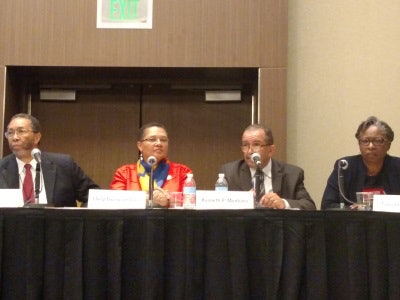SAN FRANCISCO — The Black student protests last year at the University of Missouri which prompted both System President Tim Wolfe and Chancellor R. Bowen Loftin to step down reverberated in subsequent student protests around the country. Handling such unrest among underrepresented students was a hot topic of discussion at the 98th American Council on Education Annual Meeting which concludes today.
The climate of unrest among students at numerous campuses has caused some presidents to be “so worried that they’re going to say something wrong that it has almost paralyzed them,” said Dr. Tuajuanda Jordan, president of St. Mary’s College of Maryland. “Many of them are now just hiring armies of people that script almost everything they say because they just don’t want to put anything out there and be held liable for it.”
 Dr. William B. Harvey of North Carolina A&T State University, far left, served as moderator of a panel entitled “Black Lives Matter: What Does the Higher Education Community Mean for the Movement?” that featured to his left Dr. Cheryl Davenport Dozier of Savannah State University, Dr. Kenneth P. Monteiro of San Francisco State University, and Dr. Tuajuanda C. Jordan of St. Mary’s College of Maryland.
Dr. William B. Harvey of North Carolina A&T State University, far left, served as moderator of a panel entitled “Black Lives Matter: What Does the Higher Education Community Mean for the Movement?” that featured to his left Dr. Cheryl Davenport Dozier of Savannah State University, Dr. Kenneth P. Monteiro of San Francisco State University, and Dr. Tuajuanda C. Jordan of St. Mary’s College of Maryland.Jordan served as a panelist for an ACE session entitled, “Black Lives Matter: What Does the Higher Education Community Mean for the Movement?”
However, Dr. G.P. (Bud) Peterson, president of the Georgia Institute of Technology, noted that much can be accomplished just by talking with underrepresented students. During an ACE session titled, “Decisive Leadership at the Crossroads of Diversity, Equity, and Inclusion,” Peterson said that Georgia Tech is making deposits in the “bank of goodwill” with various groups of underrepresented students “because we talk and communicate and explore and discuss when times are good.” Thus, there is money in the bank when a time of crisis prompts a withdrawal.
Thus, Peterson notes that Georgia Tech has good relations with its LGBT, Black and Hispanic communities. But, he says that the relationship with Muslim students is “not as strong as I’d like,” yet he has been working to improve that relationship.
Alluding to rhetoric in the political arena that calls for bombing wide swaths of land where large numbers of Muslim peoples dwell, Peterson said he used that opportunity to engage with that community at Georgia Tech.
“Some of these students and some of the faculty, they’ve got to be feeling oppressed when they watch television” and come away with the impression that someone is “going to kill their families.
“We just met and had a conversation;” asking members of Georgia Tech’s Muslim community, “Tell me about your experiences? What’s your experience like at Georgia Tech?”
Such actions, and others like serving Halal food twice weekly in some Georgia Tech facilities “builds goodwill with the Muslim students and builds goodwill with a lot of other students on campus.”
Another topic of discussion at the “Decisive Leadership” session was the recent vote by the Tennessee state Senate Education Committee to strip the Office for Diversity and Inclusion at the University of Tennessee of all funding, which seems to belie efforts to quell unrest among underrepresented groups across the nation. Session moderator Nancy “Rusty” Barceló, the former president of Northern New Mexico College, noted that a moral appeal may not be adequate to make the case for funding diversity offices. “We have to move beyond saying it’s just the right thing to do, even though it is,” Barceló said.
“There’s an economic issue associated with this. If we’re the fastest growing populations collectively in the country, I think they’re some security issues around this. If we don’t educate our populations, the populations that have been marginalized, I think it’s going to have a dramatic impact on our country. And the world,” she added.
During the “Black Lives Matter” session, Jordan said that diversity training should be mandated for faculty who are on the front lines when it comes to dealing with diverse student constituencies.
“People say things in classes that are incredibly offensive.
They’re not even aware” Jordan says. “You can’t change them, but you need them to be aware and pause when they’re about to say something,” and if they do say something that causes offense, “reflect on it and try to explain and apologize for it.”
Particularly potent was the acceptance speech Trinity Washington University President Patricia McGuire delivered when she received the TIAA Institute Theodore M. Hesburgh Award for Leadership Excellence in Higher Education. McGuire’s speech reverberated with a focus on diversity and inclusion issues, both within rhetoric in the national political arena and on campus.
“To make a college truly accessible to students who have lived on the margins, the institutional change cannot be marginal. It’s not a fig leaf, it’s a heart transplant, and it’s very hard,” McGuire said.
“If higher education can’t do social change … who will?”


















